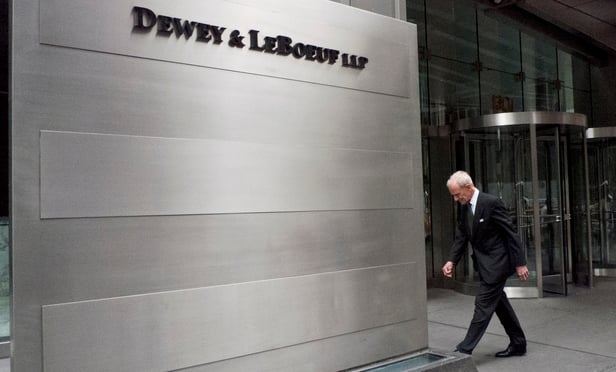The judge overseeing Dewey & LeBoeuf’s bankruptcy does not doubt that the past actions of a former tax partner at Dewey predecessor LeBoeuf, Lamb, Greene & MacRae may form the basis of a malpractice claim. He simply has no interest in being the one to decide the issue.
During a court hearing last week, U.S. Bankruptcy Judge Martin Glenn seemed eager to dispose of two malpractice suits filed in connection with the Dewey bankruptcy in recent months. The basis for the claims at the heart of both suits is tax advice given by Graham Taylor, a former LeBoeuf Lamb partner who, since leaving the firm in the early 2000s, pleaded guilty to committing federal tax fraud in Utah and relinquished his law license in California and New York.
“The question I have for all of you is, why are you here?” Glenn asked two plaintiffs lawyers in a lower Manhattan courtroom last Wednesday. “Why shouldn’t I abstain? The outcome doesn’t seem to affect the assets of the trust. Why do I have jurisdiction?”
Both suits stem from Taylor’s involvement with myCFO Inc., a financial services company that helped clients store money overseas in what turned out to be illegal tax shelters. Taylor and LeBoeuf Lamb served as legal counsel to myCFO, as well as to Chenery Associates, an investment boutique that promoted the same tax shelters to clients. Taylor helped ease investors’ concerns about the deals by issuing documents saying he had found the investments to be legally sound. The Internal Revenue Service disagreed.
In November 2005, Taylor was one of six people implicated in a federal criminal case in Utah stemming from the scheme. Prosecutors said Taylor and the others had helped clients hide money overseas from 1996 to 2005, resulting in $20 million in unpaid taxes. In 2009, after reaching a plea deal with prosecutors under which he admitted to committing tax fraud, Taylor was sentenced to 36 months’ probation and ordered to pay a $125,000 fine. One of his clients, Dennis Evanson, received a 10-year prison term.
The most recent of the two suits to dredge up Taylor’s past, filed in January by a former myCFO director, Philip Groves, blames LeBoeuf Lamb for advising Groves that the so-called nonperforming loans did not need to be registered with the U.S. government as tax shelters. Groves says in his suit that his reliance on a December 2001 opinion written by Taylor resulted in the IRS notifying him in September 2013 that he owes a $5.8 million penalty for registering tax shelters. The IRS determined that Groves could not use the defense that he relied on a legal opinion because LeBoeuf Lamb represented several parties related to the investments and had “an inherent conflict of interest,” according to his complaint.
In October, Chenery Associates and two of its principals filed their own malpractice suit in the Dewey bankruptcy citing Taylor’s tax advice. The plaintiffs in that suit seek $50 million in legal fees they say they paid LeBoeuf Lamb for its work creating and promoting the nonperforming loans. Like Groves, the plaintiffs mention an opinion from Taylor saying they did not need to register the investments as tax shelters.
The two sets of plaintiffs have agreed through a court order that they will only seek money from Dewey’s remaining malpractice insurance and not pursue money that could go to creditors. For that reason, Glenn hopes to move the suits out of his court and into either state or federal court, an arrangement to which all parties seemed agreeable.
This content has been archived. It is available through our partners, LexisNexis® and Bloomberg Law.
To view this content, please continue to their sites.
Not a Lexis Subscriber?
Subscribe Now
Not a Bloomberg Law Subscriber?
Subscribe Now
LexisNexis® and Bloomberg Law are third party online distributors of the broad collection of current and archived versions of ALM's legal news publications. LexisNexis® and Bloomberg Law customers are able to access and use ALM's content, including content from the National Law Journal, The American Lawyer, Legaltech News, The New York Law Journal, and Corporate Counsel, as well as other sources of legal information.
For questions call 1-877-256-2472 or contact us at [email protected]






